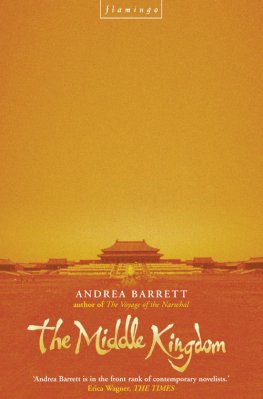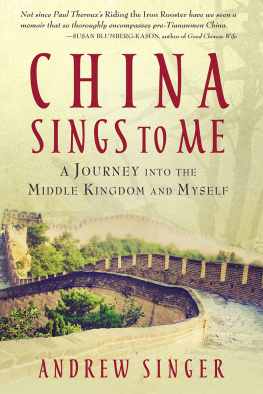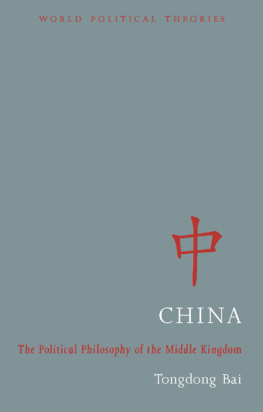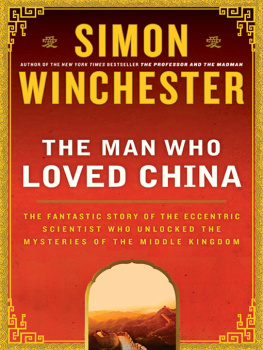Andrea Barrett
The Middle Kingdom
PATIENT: Ive experienced a feeling of general malaise for quite a long time.
DOCTOR: Since when?
PATIENT: For nearly one year.
DOCTOR: How is your appetite?
PATIENT: I have no appetite at all. I have a feeling of fullness in the upper abdomen often I really feel very heavy. My gums bled and my tongue is coated with a thin layer of whitish fur.
DOCTOR: Have you lost any weight?
PATIENT: Yes, I have lost ten pounds since last year.
DOCTOR: Let me feel your pulse. Lay your wrist on the little pillow, like this. (Patient puts his right wrist on the pillow with the palm facing upward.) Your pulse is deep and thready.
PATIENT: What does it mean?
DOCTOR: It means there is a deficiency of vital energy.
adapted from A Dialogue in the Hospitals, English-Chinese (a handbook designed to help Chinese physicians care for English-speaking patients)
ALL OF BEIJING was blanketed with smoke and rumors. From midnight on Friday, when we first heard that soldiers were trying to jog down Changan Avenue, through the chaos of Saturday and the horrors of Sunday morning, those of us still on the Qinghua campus clustered around radios and televisions and ringing phones, relaying whatever we heard and trying frantically to understand what was going on. We heard that the soldiers were unarmed, armed, armed and pumped full of amphetamines. We heard they were crashing through Tiananmen Square, crushing the demonstrators and mowing them down with machine guns; then that workers were ambushing soldiers in the streets. Someone said a soldier had been disemboweled and hung from his burning truck. Someone said snipers had shot out the windows of the Beijing Hotel. Deng was dead, we heard. The army was in charge. Li Peng had been shot in the leg and the statue of the Goddess of Democracy was down. There were two armies, six armies, the armies were fighting each other. Deng was alive and the armies were under his control. Ten thousand people had been killed, someone said. A hundred. None. In the square, someone said, the soldiers were burning bodies with blowtorches and flamethrowers. The students had captured some of the soldiers guns and were shooting back. The soldiers were driving over the students tents.
Jianming arrived wild-eyed on Sunday night and said she had seen the whole thing. Unbelievable, she said. A massacre. Worse than the worst days of the Cultural Revolution. She and a group of her friends had been huddled at the base of the Monument to the Revolutionary Heroes during the height of the shooting; at first the tracers had soared over their heads, she said, over the top of the obelisk, but then the ribbons of white light had moved lower, lower, until bullets were ringing off the granite. Theyd fled then, she said; the streets were burning. She had ridden her bike north through the alleys and back roads, avoiding the columns of smoke. Smashed buses and trucks lay on their sides, and the intersections were blocked by barricades of twisted rubble. Troops guarded the square and were still firing at anyone who approached. A truck was making a mournful procession from campus to campus; in the back, Jianming said (and she was a thoughtful, quiet girl, not given to exaggeration), in the back the bodies of five students crushed by tanks had been packed in dry ice.
That night, on Beijing Radio, we heard the Mayor talking about how the brave soldiers had crushed the counterrevolutionary riot instigated by foreign influences and hooligans, but on Monday, a student from Beijing University arrived with an armload of posters and leaflets that contradicted everything the Mayor had said.
Jianming left Monday morning for her parents home in Changsha, after hearing that soldiers and security men were beginning to sweep the campuses for troublemakers. She hadnt been deeply involved in the movement, nor had the other students Id been living and working with for the past few years. But all of them had participated theyd gone to the square in the late weeks of April, when the mood was festive, almost joyful; theyd marched in the big parade on May Fourth and had returned to the square for the demonstrations during Gorbachevs visit. But then theyd come back to campus, dismayed by the declaration of martial law and the growing rumors. And except for Jianming theyd stayed there, gathering in the courtyards and the empty rooms.
Now the professors left on campus urged the students to go home. Yan and Liren and Yuanguang left that afternoon; Yulong and Qingxin went on Tuesday. Wenwen was the last to go Wenwen, who had tutored me in Mandarin after classes and who had proved to be the brightest of the students working in Dr Yu Xiaomins lab. Wenwen and I had dissected hundreds of fish together, shared a rowboat when we went to sample the lake, cobbled together a paper chromatography setup for a demonstration.
I have to go, she said, after wed heard that the student leaders had been ordered to turn themselves in, and after wed seen some of the TV footage the government had spliced together from the tapes of the remote-control cameras mounted in the main streets and on the square. The military actions had been edited out; the images that repeated again and again were of protesters burning Army trucks, attacking soldiers, throwing bottles and bricks. Rioting, the voice-overs said. Threatening the city with chaos. Then we heard another rumor: that those cameras had been rolling quietly throughout the six weeks of demonstrations, photographing the ebullient marchers long before there was any trouble. The student who told us this warned that hundreds, maybe thousands of security men were combing those tapes now, blowing up pictures of individual demonstrators. Mug shots of the student leaders were already pasted all over the city, he said. Hot lines had been set up, so that people could turn in protesters they recognized.
What if my face turns up? Wenwen said. I was carrying a banner when I was there on the eighteenth.
In Xiaomins absence Xiaomin had been gone since Friday, and no one knew whether she was at home, or with her husband at the hospital, or caught somewhere in between; no one even knew where to hope she was, since wed all heard that the hospitals were full of troops and that the area where Xiaomins apartment was had been particularly hard-hit in Xiaomins absence, I knew Wenwen was hoping Id have some advice.
I was Xiaomins assistant not a professor, but not a student either and the students looked up to me. Id brought books and equipment into the lab that theyd never seen before, castoffs from my friends at home, which had turned into treasures here. Id lectured to Wenwen and the others in the halting Mandarin theyd taught me, and Id listened to their stories of the Qing Ming demonstrations and the Democracy Wall movement. But despite those tales, and despite all Xiaomin had told me about the other crackdowns and campaigns shed survived, I didnt know what to tell Wenwen now.
Why would they come for you? I said. You didnt do anything.
Why would they do any of this? she said.
From the window of my room, we could see students milling around the latest batch of posters and the copies, faxed from Hong Kong, of photographs of the dead and wounded. Many were crying. Some stood frozen, as if theyd never move again. Where would you go? I asked.
To find my brother, she said. And if I find him, Ill take him to some friends we have in the country. Its too dangerous here.
She was the last person on campus that I knew well. You should go too, she said, studying my face. Home, I mean. You hear the radio the government is blaming all this on foreign instigators. Americans are not safe here. Especially not women. Especially not a woman with a baby













